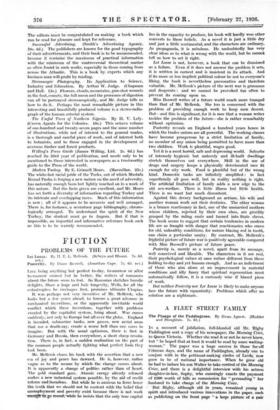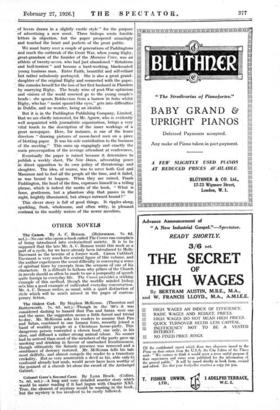A FLEET STREET FAMILY
The Plunge of the -Paddington. By Ewan Agneiv;. (Hodder and Stoughton. 7s. 6d.) Ix a moment of jubilation, full-blooded old Mr. 'Rigby Paddington sent a copy of his newspaper, the. Morning Crier, to Queen Victoria.. Whether she read it or. not he never knew, but " he hoped that at least it would be read by sonic waiting- woman." The paper was a huge success in those • far-off :Crimean days, and the name of Paddington, already one to -conjure with in the petticoat-making circles of Leeds, now grew to be of national importance. When he grew old he.had to induce'his son Walter to take control of the Morning Crier, and there is a delightful interview with his actress daughter-in-law, Sophy, who cunningly exacts the payment of 1200 worth of bills as commission for persuading " her husband to take charge of the Morning Crier.
But - Rigby, although old in years, remained young in spirit and introduced various innovations in the paper, such as publishing on the front page " a large picture of a pair
of lovers drawn in a slightly exotic style " for the purpose of advertising a new scent. Three bishops wrote.. forcible letters in objection, but the paper prospered amazingly and touched the heart and pockets of the great public.
We must hurry over a couple of generations of Paddingtons and reach the outbreak of the Great War, when young Rigby, great-grandson of the founder of the Morning Crier, was an . athlete of twenty-seven, who had just abandoned " flirtations and bull-terriers " and become a hard-working, blackcoated young business man. Enter Faith, beautiful and self-reliant but rathei nebulously portrayed. She is also a great grand- daughter of the original Rigby and connected with the paper. She consoles herself for the loss of her first husband in Flanders by marrying Rigby. The heady wine of post-War optimism and visions of the world renewed go to the young couple's heads ; she spouts Bolshevism from a barrow in Soho whilst Rigby, who has " moist spaniel-like eyes," gets into difficulties in Dublin, and no wonder, being an idealist.
But it is in the Paddington Publishing Company, Limited, that we are chiefly interested, for Mr. Agnew, who is evidently well acquainted with journalistic organization, brings a very ' vital touch to the description of the inner workings of a great newspaper. Here, for instance, is one of the lesser directors " drawing pictures of moon-faced men on a piece of blotting paper, It was his sole contribution to the business of the meeting." This sums up engagingly and exactly the main preoccupation of the average attendant at conferences.
Eventually the paper is ruined because it determines to publish a weekly sheet, The New Dawn, advocating peace in direct opposition to its own policy of threatenings and slaughter. The idea, of course, was to serve both God and Mammon and to fool all the people all the time; and it failed, as was bound to happen. When they are ruined, Frank Paddington, the head of the firm, expresses himself in a telling phrase, which is indeed the motto of the book, " What is fame, gentlemen, but a phantom ship that passes in the night, brightly illuminated, but always outward bound ?"
This clever story is full of good things. It ripples along, sparkling, fresh, wholesome, and often witty, in pleasant contrast to the muddy waters of the newer novelists.























































 Previous page
Previous page